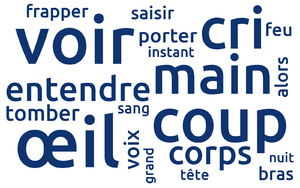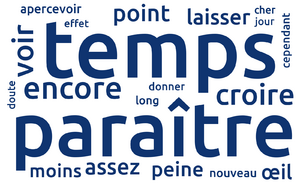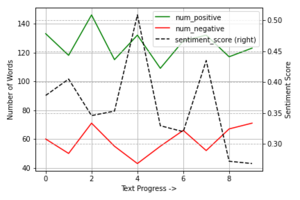Le diable amoureux (Q1040): Difference between revisions
Jump to navigation
Jump to search
imported>Steffesm (Added reference to claim: narrative location (P32): Estremadura (Q3488), Adding reference Q27) |
(Changed claim: about (P36): pastorale in litterature (Q3026)) |
||||||
| (115 intermediate revisions by 3 users not shown) | |||||||
| label / en | label / en | ||||||
Le diable amoureux | Le diable amoureux | ||||||
| label / fr | label / fr | ||||||
Le diable amoureux | Le diable amoureux | ||||||
| label / de | label / de | ||||||
Le diable amoureux | Le diable amoureux | ||||||
| aliases / fr / 0 | aliases / fr / 0 | ||||||
Le diable amoureux, nouvelle espagnole | |||||||
| Property / BGRF ID: 72.17 / reference | |||||||
| Property / author: CAZOTTE, Jacques / reference | |||||||
| Property / title: Le diable amoureux, nouvelle espagnole (français) / reference | |||||||
| Property / publication date: 1772 / reference | |||||||
| Property / publication date string: 1772 (français) / reference | |||||||
| Property / distribution format string: in-8 (français) / reference | |||||||
| Property / number of pages string: viii + 144p. (français) / reference | |||||||
| Property / narrative form string: Ire personne (français) / reference | |||||||
| Property / narrative form string: 1re personne (français) / reference | |||||||
| Property / narrative location string: Naples (français) / reference | |||||||
| Property / characters string: dom Alvare, Serano, Biondetta (français) / reference | |||||||
| Property / BGRF_plot_theme: aventures merveilleuses et fantastiques (français) / reference | |||||||
| Property / about: night / reference | |||||||
| Property / about: night / reference | |||||||
| Property / about: night / reference | |||||||
| Property / about: night / reference | |||||||
| Property / about: death / reference | |||||||
| Property / about: migration / reference | |||||||
| Property / about: travel / reference | |||||||
| Property / about: travel / reference | |||||||
| Property / about: travel / reference | |||||||
| Property / about: travel / reference | |||||||
| Property / about: attraction / reference | |||||||
| Property / about: personality / reference | |||||||
| Property / about: Topic 0:[temps paraître encore] / reference | |||||||
| Property / narrative location: Naples / qualifier | |||||||
occurence in text: 7
| |||||||
| Property / narrative location: Naples / reference | |||||||
| Property / narrative location: Venice / qualifier | |||||||
occurence in text: 14
| |||||||
| Property / narrative location: Estremadura / qualifier | |||||||
occurence in text: 10
| |||||||
| Property / narrative location: Olympia / reference | |||||||
| Property / about | |||||||
| Property / about: devil / rank | |||||||
Normal rank | |||||||
| Property / about: devil / reference | |||||||
stated in: Bauer-Funke_1998b quotation: Die erste fantastische Erzählung der französischen Literatur ist Le diable amoureux (1772). Dem Ich-Erzähler Don Alvare de Maravillas, einem jungen spanischen Adligen, erscheint in Venedig der Teufel in Gestalt der verführerischen Biondetta. | |||||||
| Property / about | |||||||
| Property / about: imagination / rank | |||||||
Normal rank | |||||||
| Property / about: imagination / reference | |||||||
stated in: Bauer-Funke_2008a quotation: André Chénier, Condorcet und Cazotte, der Wegbereiter der fantastischen Literatur („Le diable amoureux“, 1772), sind Opfer der Revolution. | |||||||
| Property / about | |||||||
| Property / about: morality / rank | |||||||
Normal rank | |||||||
| Property / about: morality / reference | |||||||
stated in: Bauer-Funke_1998b quotation: Die erste fantastische Erzählung der französischen Literatur ist Le diable amoureux (1772). Dem Ich-Erzähler Don Alvare de Maravillas, einem jungen spanischen Adligen, erscheint in Venedig der Teufel in Gestalt der verführerischen Biondetta. Alvare verfällt der Sinnlichkeit Biondettas. Doch die wiederkehrende Erinnerung an seine Mutter in Spanien, welche Tradition und Moral repräsentiert, lässt ihn schließlich die Flucht ergreifen und zu seiner Mutter zurückkehren. | |||||||
| Property / about | |||||||
| Property / about: dream / rank | |||||||
Normal rank | |||||||
| Property / about: dream / reference | |||||||
stated in: Bauer-Funke_1998b quotation: Die erste fantastische Erzählung der französischen Literatur ist Le diable amoureux (1772). Dem Ich-Erzähler Don Alvare de Maravillas, einem jungen spanischen Adligen, erscheint in Venedig der Teufel in Gestalt der verführerischen Biondetta. Alvare verfällt der Sinnlichkeit Biondettas. Doch die wiederkehrende Erinnerung an seine Mutter in Spanien, welche Tradition und Moral repräsentiert, lässt ihn schließlich die Flucht ergreifen und zu seiner Mutter zurückkehren. Da Alvare gleichzeitig der Erlebende und Berichtende ist, wird am Ende die zunächst authentisch wirkende Begegnung mit Biondetta zwar immer deutlicher durch mögliche Traumvisionen, geistige Verwirrung und Sinnestäuschungen des Protagonisten in Frage gestellt, aber letztlich doch nicht zweifelsfrei geklärt. Zwei Deutungsmöglichkeiten bieten sich an: | |||||||
| Property / about | |||||||
| Property / about: tradition / rank | |||||||
Normal rank | |||||||
| Property / about: tradition / reference | |||||||
stated in: Bauer-Funke_1998b quotation: Die erste fantastische Erzählung der französischen Literatur ist Le diable amoureux (1772). Dem Ich-Erzähler Don Alvare de Maravillas, einem jungen spanischen Adligen, erscheint in Venedig der Teufel in Gestalt der verführerischen Biondetta. Alvare verfällt der Sinnlichkeit Biondettas. Doch die wiederkehrende Erinnerung an seine Mutter in Spanien, welche Tradition und Moral repräsentiert, lässt ihn schließlich die Flucht ergreifen und zu seiner Mutter zurückkehren. | |||||||
| Property / about | |||||||
| Property / about: love / rank | |||||||
Normal rank | |||||||
| Property / about: love / reference | |||||||
| Property / about: love / reference | |||||||
| Property / about: love / reference | |||||||
| Property / about | |||||||
| Property / about: sentiment / rank | |||||||
Normal rank | |||||||
| Property / about: sentiment / reference | |||||||
| Property / about: sentiment / reference | |||||||
| Property / about: sentiment / reference | |||||||
| Property / about | |||||||
| Property / about: beauty / rank | |||||||
Normal rank | |||||||
| Property / about: beauty / reference | |||||||
| Property / about: beauty / reference | |||||||
| Property / about: beauty / reference | |||||||
| Property / about | |||||||
| Property / about: pastorale in litterature / rank | |||||||
Normal rank | |||||||
| Property / about: pastorale in litterature / reference | |||||||
| Property / about: pastorale in litterature / reference | |||||||
| Property / about: pastorale in litterature / reference | |||||||
| Property / about | |||||||
| Property / about: Topic 33:[porte grand voir] / rank | |||||||
Normal rank | |||||||
| Property / about: Topic 33:[porte grand voir] / reference | |||||||
| Property / about: Topic 33:[porte grand voir] / reference | |||||||
| Property / about: Topic 33:[porte grand voir] / reference | |||||||
| Property / full work available at URL | |||||||
| Property / full work available at URL: https://github.com/MiMoText/roman18/blob/master/plain/files/Cazotte_Diable.txt / rank | |||||||
Normal rank | |||||||
| Property / full work available at URL | |||||||
| Property / full work available at URL: https://github.com/MiMoText/roman18/blob/master/XML-TEI/files/Cazotte_Diable.xml / rank | |||||||
Normal rank | |||||||
| Property / full work available at URL | |||||||
| Property / full work available at URL: https://github.com/MiMoText/roman18/blob/master/plain/files_non_modernized/Cazotte_Diable.txt / rank | |||||||
Normal rank | |||||||
| Property / place of publication string | |||||||
Naples (français) | |||||||
| Property / place of publication string: Naples (français) / rank | |||||||
Normal rank | |||||||
| Property / place of publication string: Naples (français) / reference | |||||||
| Property / place of publication | |||||||
| Property / place of publication: Naples / rank | |||||||
Normal rank | |||||||
| Property / place of publication: Naples / reference | |||||||
| Property / exact match | |||||||
| Property / exact match: http://www.wikidata.org/entity/Q1994609 / rank | |||||||
Normal rank | |||||||
| Property / tone | |||||||
| Property / tone: fantastic elements / rank | |||||||
Normal rank | |||||||
| Property / tone: fantastic elements / reference | |||||||
stated in: Bauer-Funke_1998b quotation: Auch für die Literatur ist diese Bewegung von Bedeutung, da die erste fantastische Erzählung der französischen Literatur, Le diable amoureux (1772) von Cazotte, aus dem Umkreis der Illuministen stammt (s. S. 113-114). | |||||||
| Property / tone: fantastic elements / reference | |||||||
stated in: Bauer-Funke_1998b quotation: Als Erfinder der fantastischen Erzählung Frankreichs gilt Jacques Cazotte mit seiner „nouvelle espagnole“ Le diable amoureux (s. S. 113-114). | |||||||
| Property / intention | |||||||
| Property / intention: philosophy / rank | |||||||
Normal rank | |||||||
| Property / intention: philosophy / reference | |||||||
stated in: Schlüter_2014a quotation: aus einem ursprünglich pikaresken Teufelsmotiv entwickelt sich ein fantastisch-okkultistischer Satanismus (Jacques Cazotte, Le diable amoureux, 1772/1776), der in den Satanismus der Schauerromantik und der Romantik mündet (E. T. A. Hoffmann, Baudelaire). | |||||||
| Property / language of work or name | |||||||
| Property / language of work or name: French / rank | |||||||
Normal rank | |||||||
| Property / language of work or name: French / reference | |||||||
| Property / mentioned in | |||||||
| Property / mentioned in: Bauer-Funke_1998b / rank | |||||||
Normal rank | |||||||
| Property / mentioned in: Bauer-Funke_1998b / qualifier | |||||||
occurence in text: 3
| |||||||
| Property / mentioned in: Bauer-Funke_1998b / reference | |||||||
| Property / mentioned in | |||||||
| Property / mentioned in: Bauer-Funke_2008a / rank | |||||||
Normal rank | |||||||
| Property / mentioned in: Bauer-Funke_2008a / qualifier | |||||||
occurence in text: 1
| |||||||
| Property / mentioned in: Bauer-Funke_2008a / reference | |||||||
| Property / mentioned in | |||||||
| Property / mentioned in: Schlüter_2014a / rank | |||||||
Normal rank | |||||||
| Property / mentioned in: Schlüter_2014a / qualifier | |||||||
occurence in text: 1
| |||||||
| Property / mentioned in: Schlüter_2014a / reference | |||||||
| Property / sentiment arc diagram | |||||||
| Property / sentiment arc diagram: Cazotte Diable txt distant.png / rank | |||||||
Normal rank | |||||||
| Property / sentiment arc diagram: Cazotte Diable txt distant.png / reference | |||||||
| Property / token count | |||||||
26,070
| |||||||
| Property / token count: 26,070 / rank | |||||||
Normal rank | |||||||
| Property / token count: 26,070 / reference | |||||||
| Property / stylometric based similarity | |||||||
| Property / stylometric based similarity: Ollivier / rank | |||||||
Normal rank | |||||||
| Property / stylometric based similarity: Ollivier / qualifier | |||||||
stylometric distance value: 0.7277
| |||||||
| Property / stylometric based similarity: Ollivier / reference | |||||||
| Property / stylometric based similarity | |||||||
| Property / stylometric based similarity: L'Honneur perdu et recouvré / rank | |||||||
Normal rank | |||||||
| Property / stylometric based similarity: L'Honneur perdu et recouvré / qualifier | |||||||
stylometric distance value: 0.7805
| |||||||
| Property / stylometric based similarity: L'Honneur perdu et recouvré / reference | |||||||
| Property / stylometric based similarity | |||||||
| Property / stylometric based similarity: L’enfant du carnaval / rank | |||||||
Normal rank | |||||||
| Property / stylometric based similarity: L’enfant du carnaval / qualifier | |||||||
stylometric distance value: 0.8371
| |||||||
| Property / stylometric based similarity: L’enfant du carnaval / reference | |||||||
| Property / stylometric based similarity | |||||||
| Property / stylometric based similarity: L’enfant du bordel / rank | |||||||
Normal rank | |||||||
| Property / stylometric based similarity: L’enfant du bordel / qualifier | |||||||
stylometric distance value: 0.8431
| |||||||
| Property / stylometric based similarity: L’enfant du bordel / reference | |||||||
| Property / stylometric based similarity | |||||||
| Property / stylometric based similarity: Félicia ou mes fredaines / rank | |||||||
Normal rank | |||||||
| Property / stylometric based similarity: Félicia ou mes fredaines / qualifier | |||||||
stylometric distance value: 0.8635
| |||||||
| Property / stylometric based similarity: Félicia ou mes fredaines / reference | |||||||
Latest revision as of 12:24, 15 February 2024
No description defined
| Language | Label | Description | Also known as |
|---|---|---|---|
| English | Le diable amoureux |
No description defined |
Statements
Le diable amoureux, nouvelle espagnole (français)
1 reference
dom Alvare, Serano, Biondetta (français)
1 reference
aventures merveilleuses et fantastiques (français)
1 reference
6 references
Wordle topic modeling 2023 topic 016 nuit.png
1,600 × 1,000; 113 KB
1,600 × 1,000; 113 KB
Wordle topic modeling 2020 topic 028 nuit.png
1,600 × 1,000; 120 KB
1,600 × 1,000; 120 KB
3 references
3 references
6 references
Wordle topic modeling 2023 topic 038 voyage.png
1,600 × 1,000; 136 KB
1,600 × 1,000; 136 KB
Wordle topic modeling 2020 topic 012 migration voyage.png
1,600 × 1,000; 136 KB
1,600 × 1,000; 136 KB
3 references
3 references
3 references
1 reference
Die erste fantastische Erzählung der französischen Literatur ist Le diable amoureux (1772). Dem Ich-Erzähler Don Alvare de Maravillas, einem jungen spanischen Adligen, erscheint in Venedig der Teufel in Gestalt der verführerischen Biondetta.
1 reference
André Chénier, Condorcet und Cazotte, der Wegbereiter der fantastischen Literatur („Le diable amoureux“, 1772), sind Opfer der Revolution.
1 reference
Die erste fantastische Erzählung der französischen Literatur ist Le diable amoureux (1772). Dem Ich-Erzähler Don Alvare de Maravillas, einem jungen spanischen Adligen, erscheint in Venedig der Teufel in Gestalt der verführerischen Biondetta. Alvare verfällt der Sinnlichkeit Biondettas. Doch die wiederkehrende Erinnerung an seine Mutter in Spanien, welche Tradition und Moral repräsentiert, lässt ihn schließlich die Flucht ergreifen und zu seiner Mutter zurückkehren.
1 reference
Die erste fantastische Erzählung der französischen Literatur ist Le diable amoureux (1772). Dem Ich-Erzähler Don Alvare de Maravillas, einem jungen spanischen Adligen, erscheint in Venedig der Teufel in Gestalt der verführerischen Biondetta. Alvare verfällt der Sinnlichkeit Biondettas. Doch die wiederkehrende Erinnerung an seine Mutter in Spanien, welche Tradition und Moral repräsentiert, lässt ihn schließlich die Flucht ergreifen und zu seiner Mutter zurückkehren. Da Alvare gleichzeitig der Erlebende und Berichtende ist, wird am Ende die zunächst authentisch wirkende Begegnung mit Biondetta zwar immer deutlicher durch mögliche Traumvisionen, geistige Verwirrung und Sinnestäuschungen des Protagonisten in Frage gestellt, aber letztlich doch nicht zweifelsfrei geklärt. Zwei Deutungsmöglichkeiten bieten sich an:
1 reference
Die erste fantastische Erzählung der französischen Literatur ist Le diable amoureux (1772). Dem Ich-Erzähler Don Alvare de Maravillas, einem jungen spanischen Adligen, erscheint in Venedig der Teufel in Gestalt der verführerischen Biondetta. Alvare verfällt der Sinnlichkeit Biondettas. Doch die wiederkehrende Erinnerung an seine Mutter in Spanien, welche Tradition und Moral repräsentiert, lässt ihn schließlich die Flucht ergreifen und zu seiner Mutter zurückkehren.
3 references
3 references
2 references
Auch für die Literatur ist diese Bewegung von Bedeutung, da die erste fantastische Erzählung der französischen Literatur, Le diable amoureux (1772) von Cazotte, aus dem Umkreis der Illuministen stammt (s. S. 113-114).
Als Erfinder der fantastischen Erzählung Frankreichs gilt Jacques Cazotte mit seiner „nouvelle espagnole“ Le diable amoureux (s. S. 113-114).
1 reference
aus einem ursprünglich pikaresken Teufelsmotiv entwickelt sich ein fantastisch-okkultistischer Satanismus (Jacques Cazotte, Le diable amoureux, 1772/1776), der in den Satanismus der Schauerromantik und der Romantik mündet (E. T. A. Hoffmann, Baudelaire).
Cazotte Diable txt distant.png
432 × 288; 34 KB
432 × 288; 34 KB
1 reference
1 reference
1 reference










